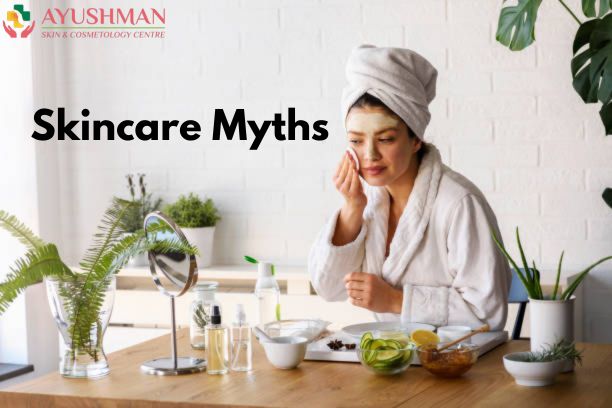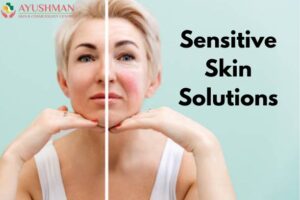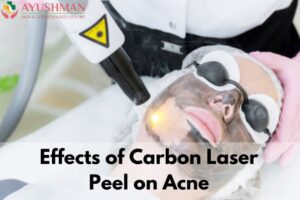Are you fed up with confusing advice about taking care of your skin? It can be tough to figure out what’s true and what’s not. There are a lot of common misunderstandings about skincare that can make you do things that don’t help and might even be bad for your skin. In this article, we’ll clear up five big skincare myths and give you the real facts. Whether you’re a skincare pro or just getting into it, knowing the truth about these skincare myths will help you make smarter choices for your skin.
Table of Contents
ToggleMyth #1: Sunscreen is Only Necessary on Sunny Days
Many people believe that sunscreen is only needed when it’s sunny outside. However, this is a common misconception. Even on cloudy or overcast days, harmful UV rays can still get through and harm your skin. Up to 80% of these rays can penetrate clouds. Additionally, surfaces like snow, sand, and water can reflect UV rays, increasing your exposure. That’s why it’s crucial to wear sunscreen with at least SPF 30 every day, regardless of the weather. This helps protect your skin from premature aging, sunburn, and the risk of skin cancer.
Understanding the Importance of Daily Sunscreen Use, Even on Cloudy or Rainy Days:
- UV rays can penetrate clouds: Cloudy days don’t block UV rays completely. Up to 80% of these rays can still reach your skin, making it important to wear sunscreen even when it’s not sunny.
- UV rays can reflect off surfaces: Surfaces like snow, sand, and water can reflect UV radiation, increasing your exposure. Whether you’re at the beach or skiing on a snowy day, wearing sunscreen is essential.
- Sun damage leads to premature aging: Exposure to the sun can cause fine lines, wrinkles, and dark spots, making your skin look older than it is.
- Sunburns are harmful: Sunburns are a clear sign of skin damage, and frequent sunburns increase your risk of skin cancer.
- Skin cancer is a real threat: Skin cancer is the most common cancer in the United States, with over 3.5 million cases diagnosed annually. Wearing sunscreen daily is a simple and effective way to reduce your risk.
Understanding UVA and UVB Rays and How They Affect the Skin:
The sun emits two types of ultraviolet radiation – UVA and UVB – which affect the skin differently.
UVA rays:
- Contributes to skin aging, wrinkles, and fine lines, as well as skin cancer.
- Can reach you indoors as they pass through glass and clouds.
- Present throughout the day and all year round, regardless of weather conditions.
UVB rays:
- Primarily harm the top layer of the skin.
- It causes sunburns, and skin reddening, and can lead to skin cancer.
- Are strongest during midday and more intense in the summer.
- Do not penetrate glass, so you are not exposed to them indoors.
To protect your skin from both UVA and UVB rays, use a broad-spectrum sunscreen with at least SPF 30 every day. This helps lower your risk of skin cancer, premature aging, and other sun damage. Additionally, wear protective clothing, seek shade during peak sun hours, and avoid indoor tanning, as it also exposes you to harmful UV radiation.
Myth #2: Expensive Anti-Aging Products are Always Better
It’s a common mistake to think that pricier anti-aging products are always more effective. While expensive options might have quality ingredients, the price doesn’t always determine the product’s effectiveness. In some cases, less expensive products may have the same active ingredients. The key is to choose anti-aging products with scientifically proven ingredients like retinoids, vitamin C, and peptides. Consistency in your daily skincare routine is crucial for the best results. Remember, anti-aging products won’t work if you don’t use them regularly.
Understanding the Effectiveness of Anti-Aging Products and Ingredients:
- Retinoids: These vitamin A derivatives, like retinol and tretinoin, promote collagen production, skin cell turnover, and reduce fine lines and wrinkles.
- Vitamin C: A powerful antioxidant, vitamin C shields the skin from environmental stressors, stimulates collagen production, and brightens the skin.
- Peptides: Short chains of amino acids, peptides help increase skin elasticity and reduce the visibility of fine lines and wrinkles.
- Alpha-hydroxy acids (AHAs): AHAs like glycolic acid and lactic acid exfoliate the skin, improve tone and texture, and reduce fine lines and wrinkles.
- Niacinamide: Vitamin B3 in the form of niacinamide brightens skin, increases elasticity, and lessens the appearance of fine lines and wrinkles.
It’s important to note that while these ingredients may work, results can vary from person to person, and noticeable changes may take weeks or months of regular use.
Why Dermatologists Recommend Certain Products:
Dermatologists recommend products based on their expertise and consider factors like:
- Ingredients: Dermatologists prefer products with clinically tested, high-quality ingredients known to be effective.
- Skin type: Recommendations are tailored to a patient’s skin type and concerns, ensuring the right product for oily, dry, or sensitive skin.
- Safety: Dermatologists endorse safe products, considering allergies, sensitivities, and any underlying health conditions.
- Brand reputation: Dermatologists suggest products from reputable companies with a track record of developing effective and safe skincare products.
Choosing the Right Anti-Aging Products:
Follow these tips to choose the best anti-aging products for your skin:
- Determine your skin type: Understand if your skin is sensitive, combination, dry, or oily to choose suitable products.
- Identify your concerns: Target specific issues like wrinkles, fine lines, uneven texture, or hyperpigmentation when selecting products.
- Look for proven ingredients: Choose products with scientifically proven ingredients like retinoids, vitamin C, peptides, and AHAs.
- Consider formulations: Select products with formulations suitable for your skin type, whether you have dry or oily skin.
- Start with one product: Introduce new products one at a time to identify their effectiveness and avoid overwhelming your skin.
- Be patient: Results may take weeks or months, so use anti-aging products consistently for the best outcome.
- Consult a dermatologist: Seek professional advice to choose the right anti-aging products tailored to your specific skin needs and concerns.
Myth #3: Exfoliating Every Day is Good for Your Skin
It’s a common mistake to think that exfoliating your skin every day is beneficial. While exfoliation can improve skin texture by removing dead cells, doing it too often or too harshly can cause problems like irritation, dryness, and damage to the skin barrier. The skin naturally goes through an exfoliation process every 28 to 40 days, shedding old cells and replacing them with new ones. Excessive exfoliation disrupts this process, leading to an imbalanced skin barrier and increased sensitivity.
How Often to Exfoliate and the Risks of Over-Exfoliation:
- Normal to oily skin: Exfoliate 1-2 times per week.
- Dry or sensitive skin: Exfoliate 1-2 times per month.
- Select a mild exfoliator that matches your skin type.
- Physical exfoliants like scrubs should be used sparingly.
- Chemical exfoliants like AHAs and BHAs can be used more frequently but must be introduced gradually.
Risks of Over-Exfoliation:
- Skin sensitivity: Damages the skin’s barrier, making it sensitive, dry, and irritable.
- Breakouts: Upsets the skin’s microbiome balance, leading to more breakouts.
- Hyperpigmentation: Increases melanin production, causing dark spots and uneven skin tone.
- Premature aging: Harms collagen and elastin fibers, making the skin less firm and elastic.
- Increased sun damage: Raises the risk of sunburn, skin cancer, and sun damage.
Choosing the Right Exfoliants:
- Opt for gentle exfoliants to prevent over-exfoliation.
- Stop using the exfoliant if you experience sensitivity or irritation.
- For sensitive or acne-prone skin, consider using chemical exfoliants like AHAs and BHAs.
Benefits of Gentle Exfoliation and How to Include it in Your Routine:
- Improved skin texture: Removes dead cells and unclogs pores for smoother, softer skin.
- Brighter complexion: Stimulates cell turnover for a brighter and less tired-looking complexion.
- Enhanced product absorption: Helps skin absorb skincare products more effectively.
- Reduced breakouts: Clears blocked pores and excess oil, minimizing acne.
Myth #4: Natural Ingredients are Always Better Than Chemicals
It’s a common belief that natural ingredients are always better for your skin, but that’s not entirely true. While some natural elements are beneficial, not all chemicals are harmful. Skincare products, whether natural or synthetic, often include chemicals that undergo thorough research and testing. Certain chemicals like hyaluronic acid, niacinamide, and retinol have been proven to improve skin texture, reduce wrinkles, and brighten the skin.
Understanding Natural Ingredients in Skincare:
- Aloe vera: Known for moisturizing and soothing qualities, it hydrates the skin, reduces redness, and calms inflammation.
- Green Tea: Rich in antioxidants, it protects the skin from environmental stressors and helps combat signs of aging.
- Vitamin C: An effective antioxidant, it lightens skin, reduces hyperpigmentation, and boosts collagen synthesis.
- Honey: A natural humectant, it draws moisture to the skin and has antibacterial properties to heal acne-prone skin.
- Jojoba Oil: Similar to natural skin oils, it improves texture, elasticity, and hydration without clogging pores.
Not all natural ingredients are safe or effective, and some may cause irritation or allergies. The key is to research and conduct patch tests before incorporating them into your skincare routine.
Understanding Skincare Chemicals and Their Benefits:
Skincare chemicals are added to products to enhance stability, efficacy, and safety. Examples include:
- Hyaluronic Acid: Naturally hydrates the skin, improves texture, and reduces wrinkles.
- Niacinamide: Also known as vitamin B3, it’s a strong antioxidant that lightens skin tone and improves the skin barrier.
- Retinol: A vitamin A derivative that promotes collagen production and improves skin texture.
- Salicylic Acid: A beta-hydroxy acid that exfoliates, clears pores and reduces acne outbreaks.
These chemicals undergo rigorous research and testing to ensure safety and effectiveness. While some people may be sensitive, when used correctly, they are generally safe for skincare.
Combining Natural and Chemical Ingredients for Maximum Effectiveness:
The most effective skincare products often blend natural and chemical ingredients, leveraging the unique benefits of each type. Natural ingredients may have hydrating and antioxidant effects, but their stability and potency can vary. On the other hand, synthetic ingredients like peptides and alpha-hydroxy acids offer more consistent and reliable results but may be harsh on the skin.
A balanced approach involves combining natural ingredients like aloe vera with synthetic ones like hyaluronic acid in a moisturizer. This creates a well-rounded and effective treatment for various skin issues, providing deep hydration and soothing properties. It’s essential to consider the advantages and disadvantages of both natural and chemical ingredients to find the best skincare routine for your needs.
Myth #5: Moisturizers are Only Necessary for Dry Skin Types
A prevalent myth suggests that moisturizers are exclusively meant for individuals with dry skin. In reality, moisturizers play a crucial role in keeping all skin types healthy. They create a protective layer on the skin, preventing moisture loss and keeping the skin hydrated. This helps improve skin texture, minimize fine lines and wrinkles, and shield the skin from environmental stressors.
Importance of Moisturizers for All Skin Types:
- Oily or Combination Skin: Even if you have oily or combination skin, using a non-comedogenic moisturizer can balance oil production and prevent breakouts. Harsh cleansers or skipping moisturizers can lead to increased oil production and breakouts.
- Sensitive Skin: People with sensitive skin should choose a moisturizer free of irritating ingredients like fragrances and dyes. Moisturizers for sensitive skin may include calming components like aloe vera or chamomile, reducing inflammation and irritation.
The function of moisturizers in sustaining the integrity of the skin barrier:
- Preventing Premature Aging: Moisturizers play a vital role in maintaining the skin barrier, crucial for healthy and youthful-looking skin. The skin barrier acts as a shield, keeping moisture in and environmental stressors out.
- Protection Against Aging: As we age, the skin naturally loses moisture, thins, and becomes more delicate, leading to wrinkles and sagging. Moisturizers help delay signs of premature aging by keeping the skin firm, elastic, and protected from environmental stressors like pollution and UV radiation.
Moisturizers benefit all skin types by preventing moisture loss, improving skin texture, and protecting against environmental factors. They contribute to maintaining a healthy skin barrier, preventing issues like dryness, sensitivity, and premature aging. So, regardless of your skin type, incorporating a suitable moisturizer into your skincare routine is essential for overall skin health.
Conclusion
It’s crucial to bust common skincare myths and get accurate information for healthy, youthful-looking skin. Believing misconceptions like only needing sunscreen on sunny days or thinking natural ingredients are always better can be harmful. Understanding the science behind skincare ingredients helps you make informed decisions about product choices and how to use them in your routine.
Whether you aim to prevent premature aging, improve skin texture, or tackle specific issues like acne or hyperpigmentation, effective products and ingredients can help. A well-rounded skincare routine, including gentle cleansing, sun protection, and regular use of a quality moisturizer, contributes to maintaining skin health and appearance over the years. By staying informed and steering clear of skincare myths, you can make the best choices for your skin, achieving the desired results.




